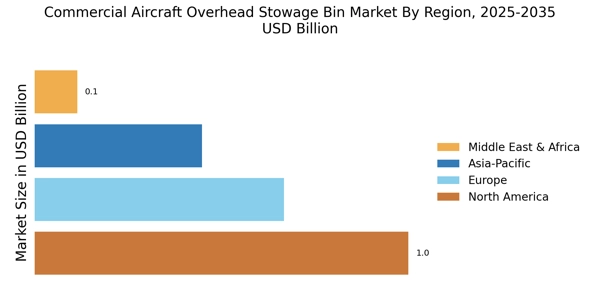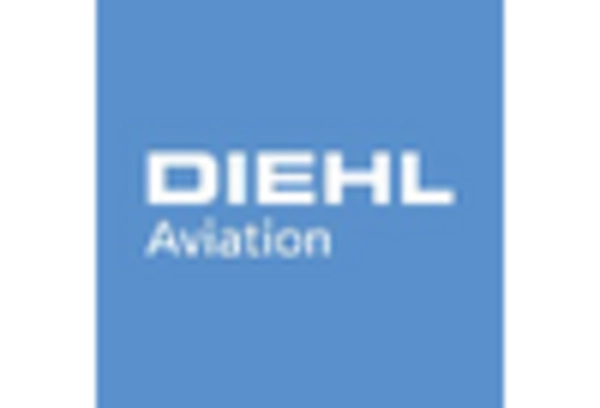Increasing Air Travel Demand
The commercial aircraft overhead stowage bin Market is experiencing growth driven by the rising demand for air travel. As more individuals opt for air transportation, airlines are compelled to enhance their cabin space efficiency. This trend is reflected in the projected increase in passenger numbers, which is expected to reach 8.2 billion by 2037. Consequently, airlines are investing in innovative overhead stowage solutions to accommodate more luggage while ensuring passenger comfort. The need for efficient stowage systems is paramount, as it directly impacts the overall travel experience. Airlines that prioritize the optimization of overhead space may gain a competitive edge in a crowded market, thereby influencing the dynamics of the Commercial Aircraft Overhead Stowage Bin Market.
Growing Focus on Passenger Experience
The Commercial Aircraft Overhead Stowage Bin Market is increasingly influenced by the growing focus on passenger experience. Airlines are recognizing that enhancing the travel experience is crucial for customer satisfaction and loyalty. As a result, there is a trend towards designing overhead stowage bins that are not only functional but also aesthetically pleasing and user-friendly. Features such as easy access, ample space, and intuitive designs are becoming standard expectations among travelers. Airlines that prioritize passenger experience may see improved customer retention and positive brand perception. This shift in focus is likely to drive innovation within the Commercial Aircraft Overhead Stowage Bin Market, as manufacturers strive to meet the evolving demands of airlines and their passengers.
Sustainability and Eco-Friendly Practices
Sustainability is becoming a pivotal driver in the Commercial Aircraft Overhead Stowage Bin Market. Airlines are increasingly adopting eco-friendly practices to reduce their carbon footprint and appeal to environmentally conscious travelers. This trend is prompting manufacturers to develop overhead stowage bins using sustainable materials and production processes. The shift towards lightweight materials not only contributes to fuel efficiency but also aligns with the broader industry goal of reducing environmental impact. As airlines commit to sustainability initiatives, the demand for eco-friendly stowage solutions is expected to rise. This focus on sustainability may reshape the Commercial Aircraft Overhead Stowage Bin Market, as stakeholders seek to balance operational efficiency with environmental responsibility.
Regulatory Compliance and Safety Standards
The Commercial Aircraft Overhead Stowage Bin Market is influenced by stringent regulatory compliance and safety standards. Aviation authorities worldwide impose regulations that dictate the design and functionality of overhead stowage bins to ensure passenger safety. Compliance with these regulations is essential for manufacturers and airlines alike, as non-compliance can lead to significant penalties and operational disruptions. The emphasis on safety has prompted manufacturers to innovate and enhance the design of stowage bins, ensuring they meet or exceed regulatory requirements. This focus on safety not only protects passengers but also fosters trust in the airline industry, thereby driving demand for compliant overhead stowage solutions. As regulations evolve, the Commercial Aircraft Overhead Stowage Bin Market must adapt to maintain compliance and ensure passenger safety.
Technological Advancements in Aircraft Design
Technological advancements are significantly shaping the Commercial Aircraft Overhead Stowage Bin Market. Innovations in materials and design are leading to lighter and more durable stowage bins. For instance, the introduction of composite materials has reduced the weight of overhead bins, allowing for increased fuel efficiency and payload capacity. Furthermore, the integration of smart technology, such as automated stowage systems, is enhancing user experience by simplifying the process of storing and retrieving luggage. These advancements not only improve operational efficiency for airlines but also cater to the evolving expectations of passengers. As airlines continue to modernize their fleets, the demand for advanced overhead stowage solutions is likely to rise, further propelling the Commercial Aircraft Overhead Stowage Bin Market.

















